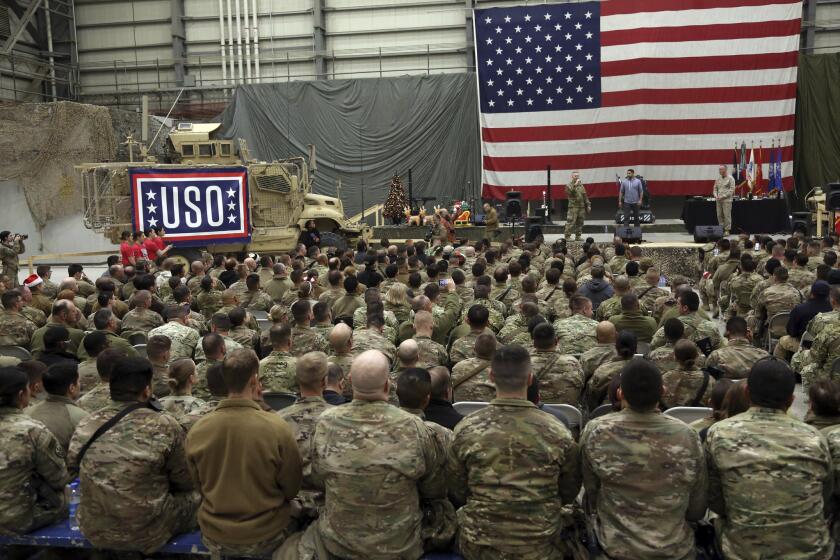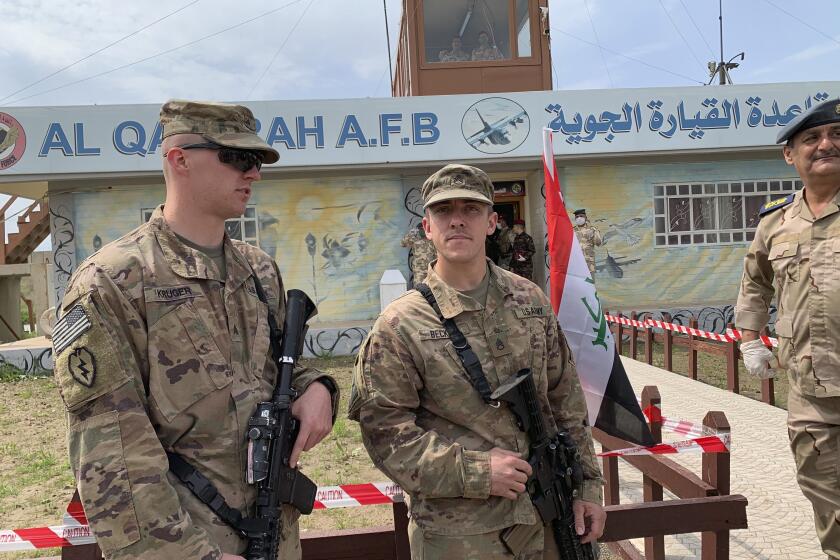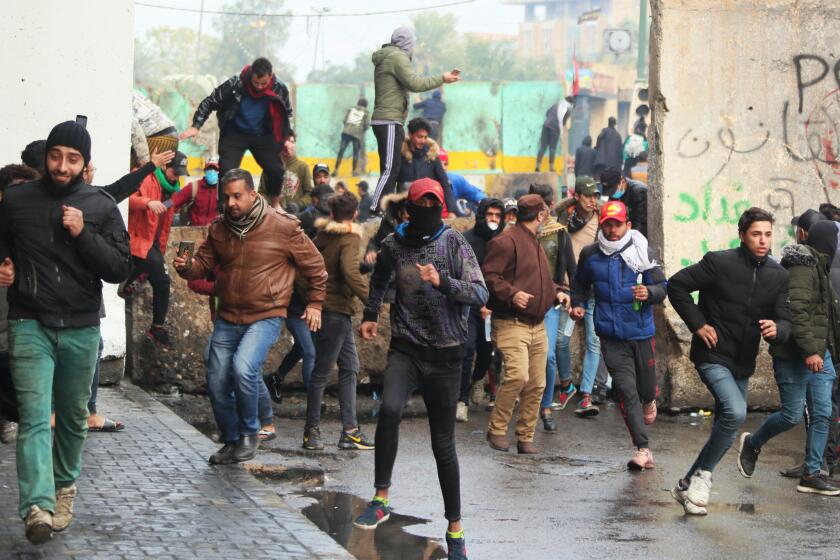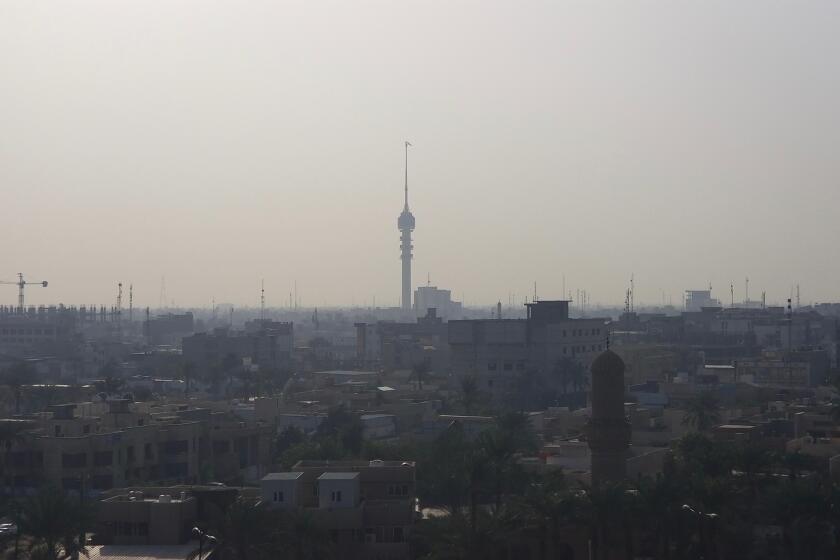Twin suicide bombings hit Baghdad, killing 32 and sparking fears of Islamic State comeback
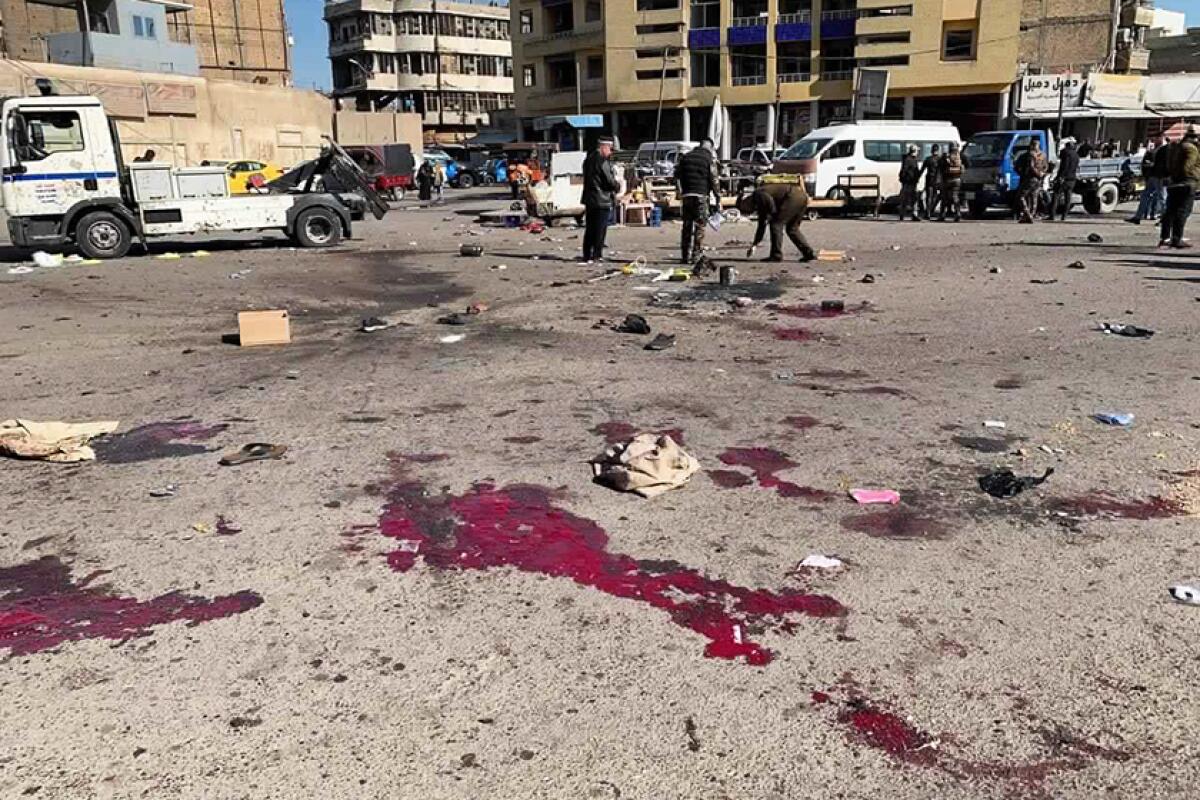
- Share via
BEIRUT — A pair of suicide bombers hit a crowded market in Baghdad on Thursday, Iraq’s civil defense agency said, killing at least 32 people, injuring more than 100 others and reigniting fears of a return to the days when such attacks were a daily occurrence in the Iraqi capital.
The first of the bombers approached Tayaran Square, a major intersection in Baghdad’s downtown area near the Bab Sharqi open-air market for used clothing and surplus military gear.
Sometime before 10 a.m., the attacker pretended to be sick to draw people to him, then detonated his explosives-laden vest, according to officials and local news reports.
As onlookers rushed to help the victims, the second suicide bomber blew himself up, leaving behind a trail of corpses and blood-streaked piles of used clothing.
Yehia Rasool, spokesman for the Iraqi Defense Ministry, said on Twitter after the attack that the bombers were being pursued by security forces when they detonated their vests.
Local media reported that security personnel deployed around the Green Zone — Baghdad’s heavily fortified government and diplomatic enclave — and sealed its main gate.
No group has claimed responsibility for the attack. But the modus operandi — the use of vests, the wait for rescue workers and onlookers to gather before a second explosion — bore the hallmarks of the extremist group Islamic State.
At President Trump’s order and despite Pentagon skepticism, acting Defense Secretary Christopher Miller announced a cut in troops in Iraq and Afghanistan.
It was the first suicide attack in Baghdad since a January 2018 bombing that also targeted Tayaran Square. If it does prove to be the work of Islamic State, it would mark a major setback for Iraqi security forces in their fight against the group.
In 2014, Islamic State had taken over one-third of the country.
For years before that, it had regularly carried out such attacks in Baghdad with impunity, dispatching operatives with vests and belts loaded with explosives and ball bearings, or bomb-laden vehicles that transformed quotidian situations such as traffic jams into potential death traps.
In response, authorities installed miles of concrete barriers known as T-walls and set up checkpoints that balkanized Baghdad, a city of 10 million people. But the measures did little to prevent a daily onslaught of bombings.
By late 2017, a U.S.-supported campaign against Islamic State succeeded in clawing back all territories under the group’s control, pushing die-hard adherents into the remote and mountainous areas of northern and western Iraq. Baghdadis enjoyed a growing sense of security that saw the dismantling of checkpoints and the removal of concrete barriers. Even the Green Zone opened to regular traffic.
The U.S. troop withdrawals from Iraq and Afghanistan are forcing military leaders to find other ways to deter potential attacks by Iran and its proxies, and to counter arguments that America is abandoning the region.
Thursday’s attack represented a serious intelligence and security lapse, said Sajad Jiyad, an Iraq analyst and fellow at the Century Foundation think tank, who had visited the Bab Sharqi area Wednesday.
“Daesh has clearly made an effort to do this,” he said, referring to Islamic State by a derisive Arabic acronym, “to get two suicide bombers with vests and get past all the checkpoints.” He added that the attackers probably relied on a workshop for suicide vests within the city’s limits rather than coming from outside the capital, where security is tighter.
But in a city looking to hold elections later this year and where few believe in coincidences, some questioned the timing of the attack, saying there were others besides Islamic State who would benefit from renewed chaos in Baghdad. They pointed the finger at state-sanctioned militias, many of which are backed by Iran and which have been blamed for killing more than 1,000 anti-government protesters and activists in the last year.
Although the militias were instrumental in defeating Islamic State, they have parlayed that victory into growing influence within the Iraqi government, critics say.
Breaking News
Get breaking news, investigations, analysis and more signature journalism from the Los Angeles Times in your inbox.
You may occasionally receive promotional content from the Los Angeles Times.
Hours after the blasts, Iraqi Prime Minister Mustafa Kadhimi convened an emergency meeting of the country’s many security and intelligence agencies, demanding an immediate investigation into the security breach.
“We will do our duty to correct any ... complacency, laxity or weakness in the ranks of the security forces that have thwarted hundreds of similar terrorist operations during the past months,” Kadhimi said in a statement after the meeting.
But the prime minister also hinted at rifts within the security services, noting that he would not allow the “scattering of intelligence efforts” or rivalries over who would take charge.
“We will work to implement security changes as required by necessities in the field,” he said. “These changes will not be subject to political pressures and wills.”
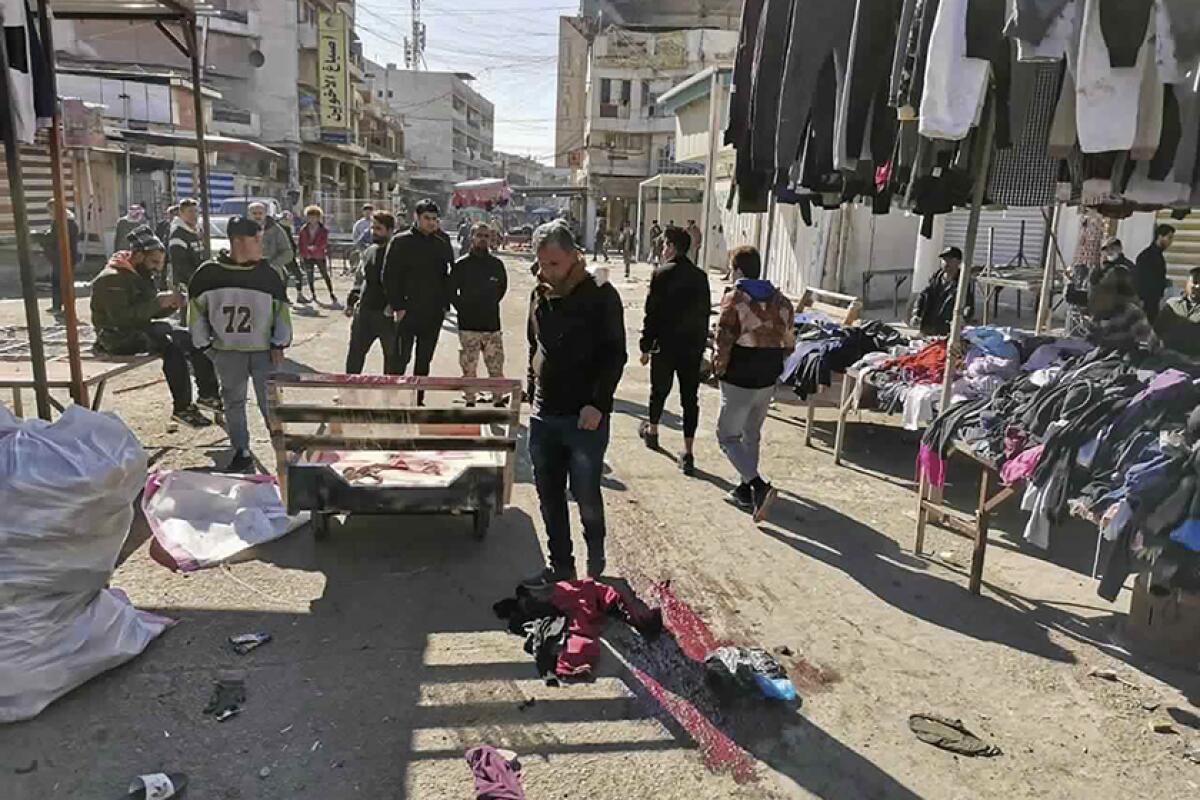
The bombings spurred a wave of condemnations, including from Iraqi President Barham Salih, who said the attack confirmed that “dark groups” were targeting “the national needs and aspirations of our people for a peaceful future.”
“We stand firmly against these rogue attempts to destabilize our country,” he added.
Diplomats in Baghdad also spoke out against the violence.
“This attack is a reprehensible act of cowardice that underscores the dangers of terrorism that millions of Iraqis continue to face. We extend our condolences to the families of these victims, and hope for the swift recovery for those who were injured,” the U.S. Embassy in Baghdad said in a statement.
A new Iraqi prime minister could help create a path toward a more productive bilateral relationship.
Others on social media and elsewhere expressed fear that the bombings were a harbinger of Islamic State’s resurrection.
“The explosion in Tayaran square is an indicator of the return of terror once more ... and it is definitely an indicator of the weakness of the security institutions once again,” tweeted Ali Bayati, a member of the Iraqi Independent High Commission for Human Rights.
Jiyad, the analyst, said that there had already been indications of the terrorist group’s comeback.
“Daesh is already out there. It’s already active,” he said, citing attacks throughout 2020 that had grown in both number and audacity, including regular mortar salvos on rural areas near the northern city of Kirkuk in recent months as well as attacks on soldiers and pro-government militias in November and December.
Like the city over which it presides — once cosmopolitan, now shattered — the Baghdad Tower is a story of hubris, war and corruption.
“It’s a low-level insurgency, yes, not like when Daesh had territorial control, but unfortunately, this ability to attack central Baghdad shows that they can target Iraqis as they did in the past,” Jiyad said.
The latest attack took place on the heels of last week’s drawdown of U.S. forces to 2,500 service personnel — one of the final acts of the Trump administration and one of its longtime goals.
Michael Knights, a senior fellow at the Washington Institute for Near East Policy who has worked with a coalition to improve security around Baghdad, said the force reduction had not affected intelligence or counter-terrorism efforts.
Knights said that security forces had been successful in thwarting many attacks, but that Islamic State may be starting to focus again on assaulting the capital.
“It’s a smart bet [Islamic State] will try to have more impact through mass-casualty events,” he said.
More to Read
Sign up for Essential California
The most important California stories and recommendations in your inbox every morning.
You may occasionally receive promotional content from the Los Angeles Times.
